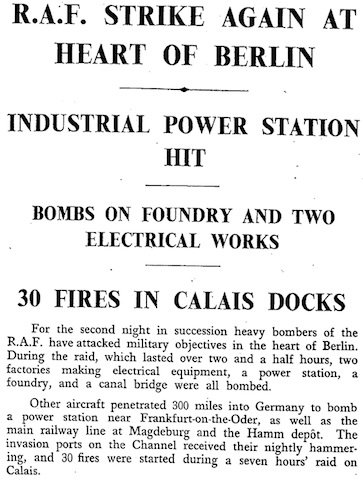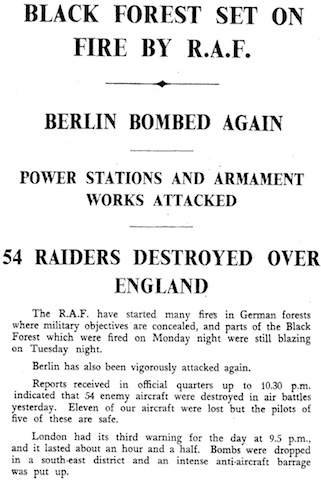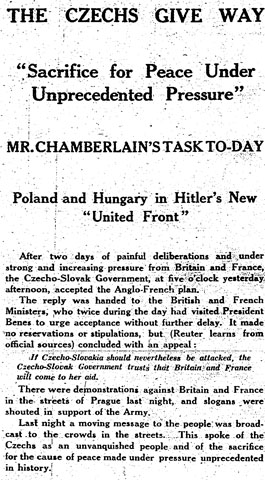
Page 4 of The Times:
For the second night in succession heavy bombers of the R.A.F. have attacked military objectives in the heart of Berlin. During the raid, which lasted over two and a half hours, two factories making electrical equipment, a power station, a foundry, and a canal bridge were all bombed.
Page 1 of the Daily Mail:
GERMANY, thanks to the R.A.F., is at last tasting the bitter medicine her Air Force administered to the defenceless Poles, Dutch, Belgians, and the French. From many neutral sources yesterday came unimpeachable evidence of the shock with which the R.A.F.’s latest raids on Berlin came to a population that was always taught to regard itself as secure. The life of Berlin, like the life of London, is being painfully revolutionised by bombs. Whole areas have had to be evacuated because of time bombs; hours of work have been advanced. And still the R.A.F. have the bombers to spare for the punishment of the would-be invading armies across the Channel.
As with yesterday’s papers, there seems to be a difference in the way The Times and the Daily Mail are reporting the RAF raids on Berlin. The Times strives for neutral language and stresses the military nature of the targets. The Mail emphasises the discomfort and shock felt by civilians, though it seems to take care not to actually talk about their deaths or maiming. Whichever version is closer to the truth (and it might be neither), calls for reprisals from both papers’ readers only seem to be increasing in number, though there are also those prepared to argue against the idea. About the only thing they all seem to agree on is that what the RAF is doing to Germany doesn’t count as reprisals.
The Mail‘s introduction summarises its inbox as follows (3):
Demands for unlimited reprisals against German cities rose to 80 per cent. of all the hundreds of letters received yesterday. But there was also an increase in the number who oppose the policy, mainly on the ground that we should not descend to the German level of barbarity. About one in eight oppose.
Actually it is being generous to the antis, then, as today it prints five letters for reprisals and two against. The Times doesn’t offer a similar analysis, but in general it has a policy of proportionality, that is, it prints a selection of letters in proportion to the opinions they represent. If that’s the case here then it would appear that its readership is much more evenly split on the issue, as there are two letters in favour of reprisals, two against, and one in between.
Here’s my selection of the letters in both papers today, organised by justification.
Firstly (literally, both papers print these letters first) there are the Biblical arguments. Unsurprisingly, these can be used for or against. Chris A. Thompson of York quotes I Samuel (Daily Mail, 3):
Now go and smite Amalek, and utterly destroy all that they have, and spare them not, but slay both man and woman, infant and suckling, ox and sheep, camel and ass.
Thompson explains that this was God’s command to Saul, a punishment for Amalek’s ‘wickedness’. Because Saul refused to smite Amalek he himself was smitten. ‘No sophistry can evade the Divine authority’, he adds, and it is ‘presumable’ that Britain is ‘His instrument’ for punishing Hitler and Mussolini. But we can set against this the argument by Hugh Lewen of Hove (The Times, 7) that Britain can’t stoop to Germany’s level: ‘Satan cannot cast out Satan. But God will.’
As the Mail says, the bulk of anti-reprisal letters argue on the basis of morality, whether explicitly religious or not. But then morality can be used to argue for reprisals too. A. L. Kennedy believes that ‘reprisals in kind against Germany would be morally justifiable’. He invokes the precedent of Napoleon, who was ‘declared to have placed himself outside the pale […] the enemy and disturber of the repose of the world’ (The Times, 7). And Hitler is clearly much worse than Napoleon ever was. How does this justify reprisal bombing? Well, Hitler could not
accomplish his will if he did not find plentiful agents of brutality in his army, navy, and air force. And, with the exception of the small band of brave and honourable opponents of the Nazi régime, the whole German nation has associated itself with its leader’s policy and methods.
But for Harold Goad, writing from the Athenaeum, the moral question has a simple answer:
Deliberate bombing of civilians is simply murder, and murder is forbidden by all the laws of God of man.
More than that, though, Germany (and Italy) are not democracies, and so there is no point in ‘punishing helpless individuals who have no power of protest’. It’s not just a question of morality but of utility too.
The bombing of German or Italian cities would only have the same effect as the bombing of English cities does, that is, strengthening the national unity and resolution to resist, which we believe must be disintegrating.
And so why not drop bombs on ‘military targets’ instead of wasting them ‘upon the useless terrorizing of civilians’? Colin Robertson of Finsbury Park agrees (Daily Mail, 3), asking readers to imagine their answer to this scenario:
If I were given one bomb to drop, should I drop it on a house, thereby demolishing it and killing perhaps a dozen people; or should I drop it on an aerodrome with the prospect of demolishing a dozen Nazi ‘planes which would otherwise be used to invade London?
On the other hand, W. Ellis of South Molton says that:
The bombing of military objectives may hasten the war, but the voice of the people might finish it. Let us hear what Berlin has to say after 48 hours’ bombing. Humanitarian reasons are simply blue-pencil nonsense.
Speaking of democracy and ‘the voice of the people’, some writers seem to suggest that reprisals should be carried out because that’s what the British people want. T. E. Williams of Bedford suggests that if the Mail were to
Send your investigators among the rank and file of the people, and you will find that demand for reprisals is blowing up to explosion point.
More enigmatically, Molly Roche, of Welwyn, says:
For God’s sake put women in charge of the R.A.F. policy before it is too late.
I think she’s suggesting that women would implement reprisals to defend their families.
There’s one way put forward which potentially satisfies both the desire for moral action and the need for useful action. In The Times (7), V. A. Cazalet, M.P., writes in to clarify an earlier letter of his which he claims has been misinterpreted:
I never advocated indiscriminate bombing of women and children. I advocate the same policy as various British Governments have in the past applied to troublesome tribes in outlying parts of the Empire. Notice is given that unless certain conditions are fulfilled by a specified date a particular village will be bombed. The inhabitants evacuate them, but their homes are bombed.
I want the same practice, when conditions permit, to be applied to certain German towns. If they are evacuated no women or children — in fact, no civilians — will be killed. I only desire that some German people should suffer the same hardships and misfortunes as are now being inflicted on our own folk. This is no more “reprisals” than it to use submarine against submarine, tank against tank, or, if the Germans were to use gas, for us to do the same.
I think that covers all the themes running through today’s letters on the subject of reprisals. You may have noticed that I haven’t included any letters from the Manchester Guardian. That’s because there are none which discuss reprisals. They’re about anything but — shelters, censorship in Jamaica, ‘Sweden’s way with drunkenness’ (10). There was a letter on 24 September arguing against reprisals, but before that the last discussion in the correspondence columns (which take up half a page, more than either The Times or the Daily Mail) was on 9 September. Do the Guardian‘s readers have nothing to say on the question of reprisals or is the newspaper not printing what they do say?
![]() This work is licensed under a Creative Commons Attribution-NonCommercial-NoDerivatives 4.0 International License.
Permissions beyond the scope of this license may be available at http://airminded.org/copyright/.
This work is licensed under a Creative Commons Attribution-NonCommercial-NoDerivatives 4.0 International License.
Permissions beyond the scope of this license may be available at http://airminded.org/copyright/.






The dichotomy between the views expressed by Harold Goad and W Ellis is striking.
It would be interesting if – in the reality of war – anybody was maintaining the two positions at once, in the manner of Trenchard and others pre-war: ‘Those continental johnnies aren’t like us plucky Brits, and while bashing us around only encourages our resolve, they’ll soon squeal if they’re given a quick thumping.’ (I paraphrase.)
I wouldn’t be at all surprised, especially at this point in the war when London is ‘taking it’ and most people seem to believe that the German people haven’t been tested in like fashion yet, if the calls for reprisals are to be believed. Later in the war it would have become much harder to sustain.
Pingback: Airminded · Post-blogging 1940: preliminary thoughts and conclusions
Pingback: Airminded · The R word